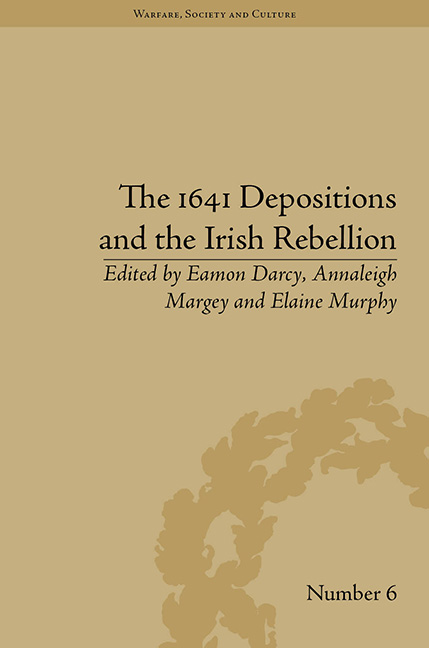Book contents
- Frontmatter
- CONTENTS
- Dedication
- Acknowledgements
- List of Contributors
- List of Figures and Tables
- List of Abbreviations
- Preface
- Introduction
- Part I The Outbreak of the Rebellion
- 1 Owen Connolly, Hugh Og MacMachon and the 1641 Rebellion in Clogher
- 2 What do the Depositions say about the Outbreak of the 1641 Rising?
- 3 Mapping the Outbreak of the Rebellion: Robberies in County Cavan (October 1641)
- 4 Mount Taragh's Triumph: Commitment and Organization in the Early Stages of the 1641 Rebellion in Meath
- Part II Social Aspects of the Rebellion
- Part III Political and Military Aspects of the Rebellion
- Conclusion: The Rebellion in Text and Context
- Notes
- Index
4 - Mount Taragh's Triumph: Commitment and Organization in the Early Stages of the 1641 Rebellion in Meath
from Part I - The Outbreak of the Rebellion
- Frontmatter
- CONTENTS
- Dedication
- Acknowledgements
- List of Contributors
- List of Figures and Tables
- List of Abbreviations
- Preface
- Introduction
- Part I The Outbreak of the Rebellion
- 1 Owen Connolly, Hugh Og MacMachon and the 1641 Rebellion in Clogher
- 2 What do the Depositions say about the Outbreak of the 1641 Rising?
- 3 Mapping the Outbreak of the Rebellion: Robberies in County Cavan (October 1641)
- 4 Mount Taragh's Triumph: Commitment and Organization in the Early Stages of the 1641 Rebellion in Meath
- Part II Social Aspects of the Rebellion
- Part III Political and Military Aspects of the Rebellion
- Conclusion: The Rebellion in Text and Context
- Notes
- Index
Summary
Welcome yee Peeres, yee Earles of our Shires
yee Viscounts, and Barons together.
Taragh the Mount, his ioyes doth account
Being grac'd with your greatefull presence.
The outbreak of the rebellion on 22 October 1641 was a reaction to cumulative economic, social and religious pressures on the part of members of the Catholic elite in Ulster, eagerly supported by their social inferiors. Parliamentary pressure for change had proved unavailing and men like Phelim O'Neill, Coll MacMahon, Rory O'More and others saw no other way out of their difficulties, although they consistently stressed their loyalty to the crown. The failure of the intended rebellion in Dublin presumably discouraged others who might have joined in, but despite this the rebellion spread quickly within and outside Ulster, including into Meath and Louth. The Old English gentry faced a dilemma, whether to join with their co-religionists or to maintain their traditional stance of loyalty. The administration's reaction – demanding but refusing to accept their loyalty, appointing key men like Lord Gormanston as governors of counties and issuing a small number of weapons for their defence, but then withdrawing them within a fortnight – left them mistrusted, defenceless and exposed. The violent actions of some members of the administration, such as Charles Coote, confirmed the worst fears of the Catholic population. Simultaneously, the Old English peers and gentry came under considerable pressure from the northern rebels to join them, and also saw the lower orders and towns joining in the rebellion. For Gormanston, the turning point appeared to be when the administration ignored his warning about the likelihood of troops which were being sent, under a very inexperienced officer, to relieve the siege of Drogheda, being attacked en route. When the rebels routed those troops at Julianstown on 29 November 1641, Gormanston decided to throw in his lot with the northern rebels and summoned his fellow Meathmen to a meeting at Duleek around 3 December 1641. This meeting, relocated to the Hill of Crofty, marked the Old English Meath community's formal commitment to the rebellion; a subsequent gathering at Tara four days later agreed the process for the conduct of the military campaign, including personnel and supplies, and also maintaining order in the county at a time of national upheaval.
- Type
- Chapter
- Information
- The 1641 Depositions and the Irish Rebellion , pp. 51 - 64Publisher: Pickering & ChattoFirst published in: 2014



